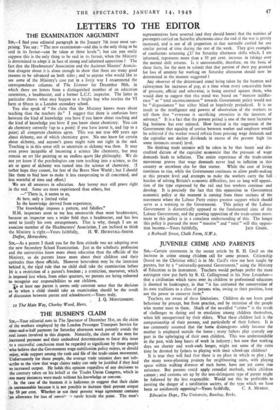THE BUSMEN'S CLAIM
Sin,—Your editorial note in The Spectator of December 31st, on the claim of the workers employed by the London Passenger Transport Service for time-and-a-half payment for Saturday afternoon work patently avoids the .real issues involved in this dispute. Naturally, the claim of the men for . increased payment and their undoubted determination to force this issue to a successful conclusion must be regarded as significant by those people who believe that the Government wage stabilisation policy enjoys, or should enjoy, wide support among the rank and file of the trade-union movement. 'Unfortunately for those people, the average trade unionist does not -sub- :scribe to the view that wage claims today can only be justified if they lead -to increased output. He holds this opinion regardless of any decisions to the contrary taken on his behalf at the Trades Union Congress, which in too many instances were made without his knowledge or content.
In the case of the busmen it is ludicrous to suggest that their claim is unreasonable because it is not possible to increase their present output by 50 per cent. Whether or not their present wage agreement contains 'an allowance for loss of ameni*• 't curdy beside the point. The men's representatives have asserted (and they should know) that the number of passengers carried on Saturday afternoons since the end of the war is greatly increased, and is out of all proportion to that normally carried for any similar period of time during the rest of the week. They give examples of conductors returning £17 for Saturday afternoon shifts which, I am informed, represents more than a 50 per cent. increase in takings over the normal shift returns. Is it unreasonable, therefore, on the basis of these facts, for the men to submit that that portion of their pay granted for loss of amenity for working on Saturday afternoon should now be determined in the manner suggested ?
Any observer of the determined stand being taken by the busmen and railwaymen for increases of pay, at a time when every conceivable form of pressure, official and otherwise, is being exerted against them, who would dare to suggest that this stand was based on " massive indiffer- ence " or " total unconsciousness " towards Government policy would not be " dispassionate " but either blind or hopelessly prejudiced. It is an insult to the intelligence and powers of observation of the workers to tell them that "everyone is sacrificing amenities in the interests of solvency." It is a fact that the present period is one of the most lucrative big business has ever enjoyed. How farcical is the suggestion of the Government that equality of service between worker and employer would be achieved if the worker would refrain from pressing wage demands and the capitalist not declare dividends in excess of the present high (in some instances record) level.
No thinking trade unionist will be taken in by that hoary and dis- credited dictum of the capitalist economist that the pressure of wage demands leads to inflation. The entire experience of the trade-union movement proves that wage demands never lead to inflation in this country or anywhere else for that matter. While the cost of living continues to rise, while the Goiterrunent continues to allow profit-making at this present level and attempts to make the workers carry the full burden of solving Britain's economic difficulties, just so long will opposi- tion of the type expressed by the rail and bus workers continue and develop. It is precisely the fact that this opposition to Government economic policy at the moment is coming from those sections of the movement where the Labour Party enjoys greatest support which should serve as a warning to the Government. This policy of the Labour Government is diametrically opposed to the fundamental aims of the Labour Government, and the growing opposition of the trade-union move- ment to this policy is in a conscious understanding of this. The longer this policy is pursued the more " massive " and " total " will this opposi-
tion become.—Yours faithfully, JACK GRAHL. 2 Rothwell Street, Chalk Farm, N.W.r.


































 Previous page
Previous page